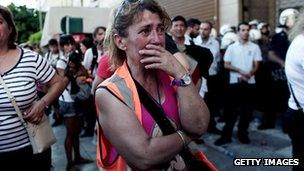Greece secures a further 6.8bn euros of bailout funds
- Published

Troubled times in Greece
Greece has passed another hurdle in its bailout programme, by securing the next instalments of funds that are keeping the country afloat.
The money, totalling 6.8bn euros ($8.7bn), will come from the troika of the European Commission, the European Central Bank and the International Monetary Fund (IMF).
But they said that Greece's reform programme is moving too slowly.
The troika added that the country's economic outlook remains uncertain.
Eurozone finance ministers meeting in Brussels said 2.5bn euros ($3.2bn) would come from the eurozone rescue fund and 1.5bn euros ($1.9bn) from European Central Bank.
While the payments are likely to be made this month, another 500m euros ($643m) from the rescue fund, plus 500m euros from the European Central Bank will follow in October.
Then the IMF will loan 1.8bn euros ($2.3bn), bringing the overall total to 6.8bn euros.
Strings attached
The loans are conditional on Greece making progress with its reform programme.
Greece's creditors have warned that reforms are behind schedule, especially the privatisation of state assets. Last month, the sell-off of the public gas company collapsed.
But the reforms have caused much anger in Greece.
Around 25,000 civil servants will be put on reduced salaries, before either being dismissed or redeployed.
That will add to the nation's unemployment rate which already stands at 27%.
Meanwhile, thousands of Greek municipal workers and school teachers took to the streets of Athens on Monday in a noisy protest against public sector layoffs.
Public unrest has lead to political instability, and four different Greek governments in as many years.